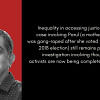Call for a transparent, participatory process
The tenures of the incumbent chairman and members of the National Human Rights Commission (NHRC), Bangladesh, will expire on June 23, 2016. On that day, all members of the commission, except one, will reach the end of their two consecutive terms, which is the maximum legal limit. It is thus anticipated that all the posts, including those of the chairman, full-time member and five honorary members, will be filled by new appointees. One member, however, can be considered for reappointment.
The government has around six months before making new appointments. In accordance with the Commission's founding law, a selection committee headed by the Speaker of Parliament selects the NHRC members to be finally chosen and appointed by the president. Other members of the Committee are - the Law and Parliamentary Affairs Minister, Home Minister, Chairman of the Law Commission, Cabinet Secretary and two lawmakers (one of them from the opposition party) chosen by the Speaker. The quorum requirement is met if four of the seven members of the committee are present at the meeting. This means the Speaker can make the final decision if two ministers and the Cabinet Secretary attend the meeting. Also, the ruling party lawmaker can be easily managed to attend the meeting to meet the quorum requirement, if necessary.
A careful look at the composition of the selection committee reveals that the government can easily choose candidates for the post of NHRC chairman and members, as per their interest. Concerns have been raised earlier from different quarters regarding the composition of the selection committee, while rights organisations have always raised strong objections in this regard.
This is what the International Coordinating Committee for National Human Rights Institutions (ICC), the global body under the mandate of United Nations which accredits national human rights institutions, also noted when it ranked NHRC, Bangladesh as a 'B' category institution in 2010. It observed at the time that the NHRC could not be conferred the 'A' status, as the government's control over the selection committee was obvious and it had no representation of the civil society.
After five years, the ICC did another review in March 2015 to decide whether NHRC, Bangladesh could be upgraded to an 'A' category institution. NHRC, Bangladesh then informed the ICC that it had sent a proposal to the government for bringing changes to the selection committee, including raising the number of committee members from seven to eleven. The NHRC proposed that an Appellate Division judge, Chairman of the Public Service Commission, the Vice-Chancellor of a public university and a civil society member chosen by the Speaker of Parliament be included in the selection committee, in addition to the existing seven members.
According to NHRC's proposal, the presence of six members should meet the quorum requirement. This means the decision could be easily made if another member of the selection committee is present at the meeting, along with the Speaker, two ministers, Cabinet Secretary and the ruling party lawmaker. In the present scenario, it is not at all difficult for the government to influence the opinion of the Vice-Chancellor or opposition lawmaker, who will be in the selection committee.
The international standard on national human rights institutions, known as the Paris Principles, emphasise on the representation of civil society members in the selection committee. The NHRC was guided by the Paris Principles to propose the inclusion of a civil society member in the Selection Committee. However, we are afraid that the proposal would not be able to bring any fundamental change in the independent functioning of the selection committee, as it is still very easy for the government to make the appointments as per their interest. Moreover, the NHRC proposal would not have any implication as long as this is not included in the founding law through an amendment. For this reason, the ICC was not very convinced with this amendment proposal and once again accredited the NHRC as a 'B' category institution.
Apart from the selection committee, the Paris Principles also provide guidelines for the selection process, which states:
'It is critically important to ensure the formalisation of a clear, transparent and participatory selection and appointment process of the National Human Rights Institution's decision-making body in relevant legislation, regulations or binding administrative guidelines, as appropriate. A process that promotes merit-based selection and ensures pluralism is necessary to ensure the independence of, and public confidence in, the senior leadership of a National Institution.Such a process should include requirements to:
a) Publicize vacancies broadly;
b) Maximize the number of potential candidates from a wide range of societal groups;
c) Promote broad consultation and/or participation in the application, screening, selection and appointment process
d) Assess applicants on the basis of pre-determined, objective and publicly available criteria;
e) Select members to serve in their own individual capacity rather than on behalf of the organization they represent.'
According to the founding law, the Selection Committee is supposed to propose two candidates for each position and the President would finally appoint one among them. During the previous selection of the commission members, we were kept in the dark about which candidates the selection committee had considered, why they were considered, and also the names recommended to the President. We only came to know about that after the final appointments were made.
It is crucial that the members of a key national institution like the NHRC are appointed through an open and transparent process. This is also important for the credibility of the institution. People's trust on the institution can grow and the government can also earn acclamation, if the NHRC chairman and members are appointed through an open and transparent process in consultation with different stakeholders.
Will the government consider doing this?
The writer is a human rights defender.

 For all latest news, follow The Daily Star's Google News channel.
For all latest news, follow The Daily Star's Google News channel. 








Comments